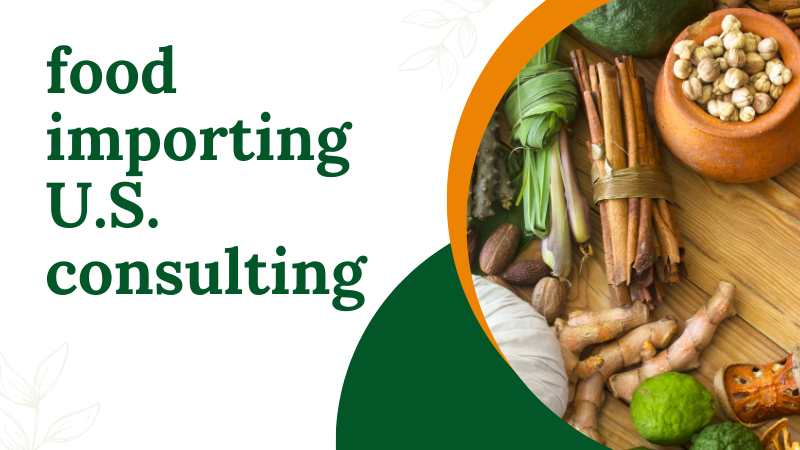Food Importing U.S. Consulting: Your Comprehensive Guide
Hey there! If you’ve ever considered entering the food importing business in the U.S., you’re not alone. With an increasing demand for diverse culinary experiences, the opportunities are immense. The U.S. food import market is worth over $100 billion. This offers a great chance for entrepreneurs to tap into this growing sector.
As someone who has navigated the complexities of food importing, I can tell you that while it’s an exciting industry, it’s also filled with challenges. From navigating complex regulations and logistics to staying on top of market demands, there’s a lot to know. But don’t worry—I’ve got you covered. This guide explains food importing consulting in the U.S. It covers important rules and the benefits of hiring a consultant. By the end, you’ll have the knowledge and confidence to dive into the food importing business.
What You Will Learn:
How a consultant can help your business
The importance of food importing consulting
Key regulations you need to know
Steps to successfully import food

What is Food Importing Consulting?
Why Is It Essential?
Food importing consulting helps businesses that want to import food into the U.S. It covers everything from FDA rules to logistics.
Here’s a cool fact. The FDA oversees over 80% of the U.S. food supply. So, compliance is crucial for anyone wanting to succeed in this field. Imagine trying to bake a cake without flour—it’s impossible, right? Also, trying to import food without knowing the rules can lead to failure.
What Regulations Should You Know About?
Key U.S. Regulations for Food Importing
Navigating U.S. food import rules is like walking a maze blindfolded. Here are some key regulations you need to be aware of:
- FDA Regulations: All imported food must meet the FDA’s guidelines. They include safety and labelling standards.
- USDA Regulations: If you import meat, poultry, or eggs, follow the USDA’s FSIS rules.
- Customs Regulations: Know U.S. Customs and Border Protection (CBP) rules. This avoids fines and shipment delays.
The FDA’s Import Alert system helps you monitor specific products. They have previously violated safety standards. It’s cool. This tool can be invaluable for ensuring compliance!
Common Mistakes in Compliance
- Neglecting Labelling Requirements: Products must have labels that meet FDA guidelines. Inadequate labelling can lead to product recalls.
- Not Keeping Up with Changes: Food regulations can change frequently. Staying informed is crucial to avoid penalties.
Quick Tip Box:
- Stay Updated: Subscribe to FDA newsletters or check their website for updates on food safety.
How Can a Consultant Help You?
Benefits of Hiring a Food Importing Consultant
Trust me, I’ve tried this, and having a consultant on your side can save you time, money, and a lot of headaches. Here’s how a consultant can help:
- Expert Knowledge: They bring expertise in navigating complex regulations and ensuring compliance.
- Market Insights: Consultants can give valuable market data. It can help you spot trends and consumer preferences.
- Networking: Established consultants know suppliers, distributors, and regulators. They can help find the right partners.
- Logistical Support: Consultants can streamline shipping and customs to minimise delays.
Real-World Example
Imagine you’re trying to import a speciality cheese from Italy. Dairy product regulations are strict. One mistake could cost you thousands. A consultant would check your documents. This would help you avoid costly compliance issues.
Steps to Successfully Import Food
1. Research Your Product
Start by understanding the product you wish to import. What are its unique selling points? Is there a demand for it in the U.S. market?
2. Identify Suppliers
Finding reliable suppliers is key. Look for producers with a good reputation and quality assurance practices.
3. Ensure Compliance
Ensure your suppliers can provide all documents. This includes health certificates and proof of U.S. compliance.
4. Develop a Logistics Plan
Shipping food can be tricky, especially with perishable items. Work with logistics companies that specialise in food products.
5. Prepare for Customs
Work with a customs broker. They will ensure all import duties and tariffs are paid, and the documentation is correct.
6. Market Your Product
Once your product arrives, you’ll need to market it effectively. Consider online platforms, local stores, or speciality markets.
Frequently Asked Questions (FAQ)
You can import food products, including packaged goods, fresh produce, meat, and dairy. They must comply with US regulations.
Use online directories, food trade shows, and industry networks to find reputable suppliers.
Costs can vary widely. They may include shipping fees, customs duties, and compliance costs.
Yes, you can import food for personal use, but it must still comply with U.S. regulations and may be subject to limits.
Use reputable suppliers. Ensure compliance with all regulations. Test samples before distribution.
A customs broker helps you with complex customs rules. They ensure your goods are cleared quickly.
Conclusion
In conclusion, food importing in the U.S. presents great opportunities. However, it also needs careful planning and strict rule compliance. Navigating the complexities of FDA, USDA, and CBP rules can be a challenge, but with the right knowledge and support, you can succeed.
Hiring a food importing consultant gives you expert advice. This guidance helps you avoid mistakes, improve operations, and boost your business success. Whether you’re starting out or refining your strategy, knowing U.S. regulations helps. Hiring a consultant can also give you the edge you need.
Ready to take the plunge into food importing? You can start a successful food import business in the U.S. with the right prep and support. If you have questions or stories to share, drop a comment!
Ready to take the plunge? If you want to import food, explore consulting options. You need the right knowledge to succeed. Let me know in the comments if you have any questions or experiences to share!






